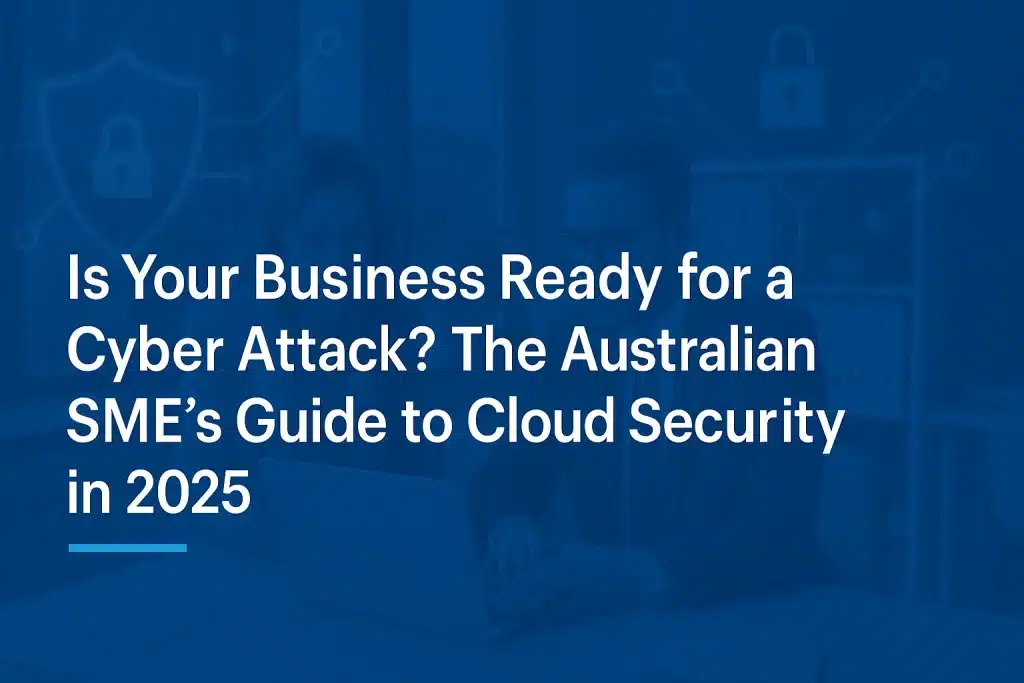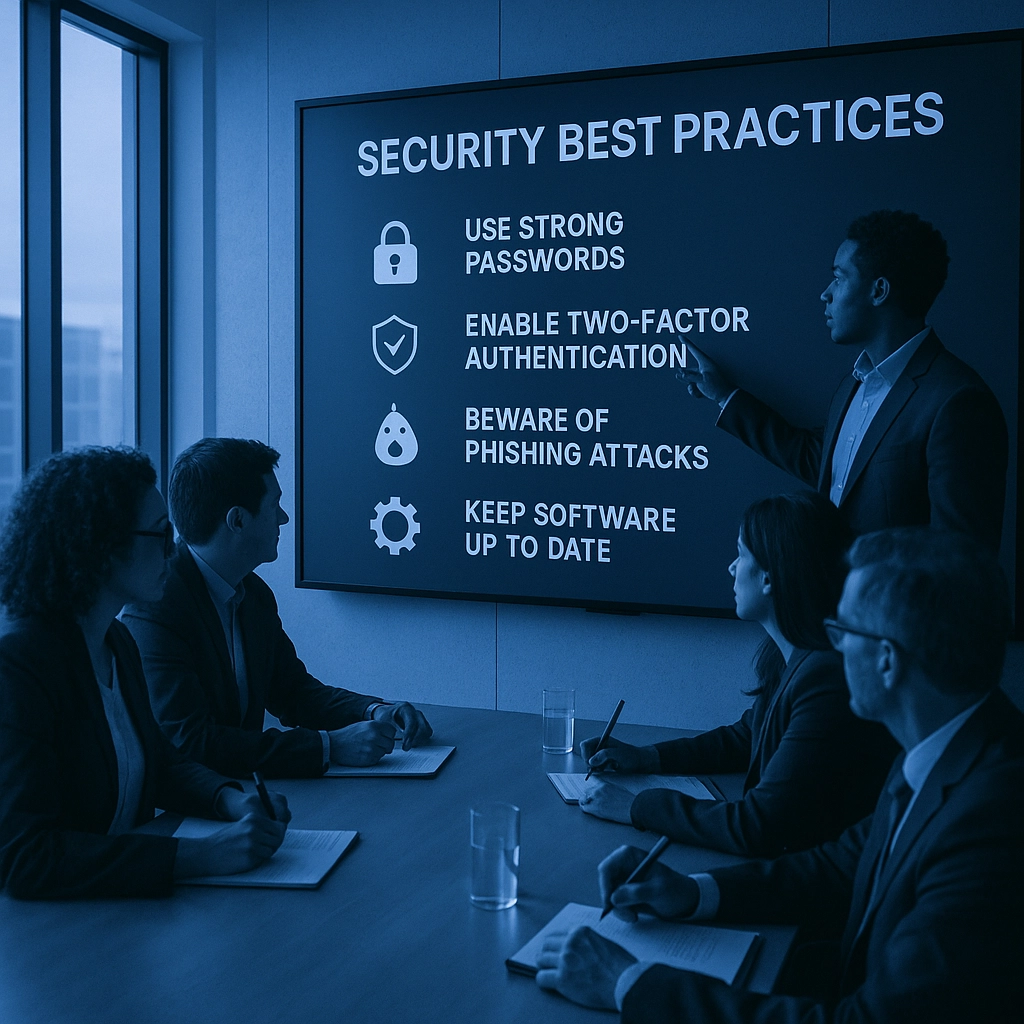Let’s be honest – when you’re running a small business in Australia, cyber security probably isn’t the first thing on your mind in the morning. You’re thinking about customers, cash flow, staff, and a million other things that keep your business ticking. But here’s the wake-up call: cyber attacks are costing Australian SMEs an average of $49,600 per incident in 2025, and that’s just the average. For many small businesses, a successful cyber attack isn’t just expensive – it’s business-ending.
The good news? You don’t need a massive IT budget or a team of security experts to protect your business. With the right approach to cloud security, you can build solid defences that won’t break the bank. Let’s dive into what you need to know to keep your business safe in 2025.
The New Reality: What’s Changed in 2025
The cyber threat landscape has evolved dramatically, and unfortunately, not in our favour. AI-powered attacks are now the norm rather than the exception. Cybercriminals are using artificial intelligence to create more sophisticated, personalised attacks that adapt in real-time. What does this mean for your business? Those generic phishing emails that were easy to spot are now being replaced by convincing, targeted messages that seem to come from trusted sources.
Cloud vulnerabilities have also become a major concern. As more Australian businesses move their operations to the cloud (and let’s face it, most of us have), attackers have shifted their focus too. Misconfigurations, weak passwords, and unsecured access points in cloud services are now prime targets.
But here’s the challenge for SMEs: unlike large corporations with dedicated IT teams, small businesses often lack the resources and expertise to stay ahead of these evolving threats. You’re expected to be a marketing expert, financial guru, HR manager, and now a cyber security specialist too. It’s simply not realistic.
The Cloud Security Essentials Every Australian SME Needs
Multi-Factor Authentication (MFA): Your First Line of Defence
If you take away just one thing from this guide, let it be this: implement multi-factor authentication on everything. MFA is like having a second lock on your door – even if someone gets hold of your password, they still can’t get in without that second factor.
For your most critical systems and admin accounts, consider investing in hardware tokens or biometric authentication. Yes, it’s an extra step for your team, but it’s a small inconvenience compared to dealing with a data breach.
Role-Based Access Control: The Principle of Least Privilege
Think about your physical office for a moment. You wouldn’t give every employee a key to every room, would you? The same logic applies to your digital systems. Role-based access control (RBAC) ensures that staff members only have access to the systems and data they need to do their jobs.
Set up your cloud services so that your sales team can access customer data but not financial records, and your admin staff can access payroll systems but not customer databases. It’s common sense, really, but it’s surprising how many businesses give everyone access to everything “just in case.”
Encryption: Making Your Data Unreadable to Attackers
Encryption might sound technical, but think of it as a secret code for your data. Even if attackers manage to steal your information, encrypted data is essentially useless to them without the key. Most reputable cloud providers offer encryption as standard, but make sure it’s turned on and properly configured.
Building Cost-Effective Security on a Small Business Budget
The Layered Security Approach
Instead of spending thousands on one expensive security solution, consider building multiple layers of affordable protection. It’s like having a security system, locks, and an alarm – if one fails, the others are still there to protect you.
Start with the basics: good antivirus software, regular backups, and staff training. Then add layers like email filtering, network monitoring, and access controls. Each layer doesn’t have to be expensive, but together they create a robust defence system.
The Essential Eight Framework: Your Security Roadmap
The Australian Cyber Security Centre has developed the Essential Eight – a framework specifically designed to help businesses like yours implement effective cyber security measures. You don’t need to implement all eight strategies at once, but aim for at least Maturity Level One as your starting point.
The framework prioritises the most impactful security measures, making it perfect for businesses with limited resources. It’s like having a security expert map out your priorities for you.
Choose Your Cloud Provider Wisely
Not all cloud providers are created equal when it comes to security. The major players – Google, Microsoft, Amazon – invest billions in security infrastructure and employ some of the world’s best security experts. By choosing a reputable provider, you’re essentially getting enterprise-level security at a fraction of the cost.
These providers also use AI to detect and counter AI-powered attacks, creating an arms race that works in your favour. Let them fight the cyber criminals while you focus on running your business.
The Human Element: Your Biggest Asset and Vulnerability
Staff Training: Your Most Important Investment
Here’s an uncomfortable truth: most successful cyber attacks succeed because of human error, not technical failures. An employee clicking on a malicious link or falling for a social engineering scam can bypass all your technical defences in seconds.
Invest in regular cyber security training for your team. Make it engaging, relevant, and ongoing. Teach them to recognise scam emails, suspicious phone calls, and social engineering attempts. Most importantly, create a culture where staff feel comfortable reporting suspicious activity without fear of blame.
Create an Incident Response Plan
Despite your best efforts, incidents can still happen. Having a clear response plan means you can act quickly to minimise damage. Your plan should include:
- Who to contact immediately (IT support, authorities, customers if necessary)
- How to isolate affected systems
- Communication protocols for staff and customers
- Steps for recovery and business continuity
Regular Updates and Maintenance
This might seem obvious, but keeping your software up to date is one of the most effective security measures you can take. Cyber criminals actively look for businesses running outdated software with known vulnerabilities.
Set up automatic updates where possible, and schedule regular reviews to ensure all your systems are current. Yes, updates can sometimes be inconvenient, but they’re far less disruptive than dealing with a security breach.
Practical Steps to Get Started Today
Immediate Actions (Do These Now)
- Enable MFA on all your cloud services and email accounts
- Conduct a quick audit of who has access to what systems
- Ensure all software is up to date
- Set up automatic backups for critical data
- Have a conversation with your team about cyber security awareness
This Month’s Goals
- Implement a password policy (long, unique passwords for all accounts)
- Review and configure your cloud service security settings
- Set up email filtering to catch malicious messages
- Create a basic incident response plan
- Schedule regular security training sessions
Ongoing Security Habits
- Monthly security reviews and updates
- Quarterly access audits (remove access for ex-employees, adjust permissions)
- Annual security assessments with a professional
- Continuous staff education and awareness programs
The Bottom Line: Prevention is Cheaper Than Recovery
The statistics don’t lie – with the average cyber attack costing Australian SMEs nearly $50,000, even a modest investment in security measures pays for itself many times over. More importantly, good security practices protect your reputation, customer trust, and business continuity.
You don’t need to become a cyber security expert overnight, but you do need to take it seriously. Start with the basics, build your defences gradually, and don’t be afraid to ask for help when you need it.
Cloud security in 2025 isn’t about implementing every security measure available – it’s about making smart, strategic choices that protect your business without overwhelming your budget or operations. With the right approach, you can build robust defences that let you sleep soundly while your competitors worry about their next cyber attack.
Remember, in the world of cyber security, being prepared isn’t paranoid – it’s good business. Your future self (and your accountant) will thank you for taking action today.
Need help implementing these security measures or want a professional assessment of your current setup? Contact Cloud Computer Company on 1300 812 972, email info@cloudcomputercompany.com.au, or visit our website at https://www.cloudcomputercompany.com.au. We specialise in helping Australian small businesses build effective, affordable cloud security solutions that actually work in the real world.



